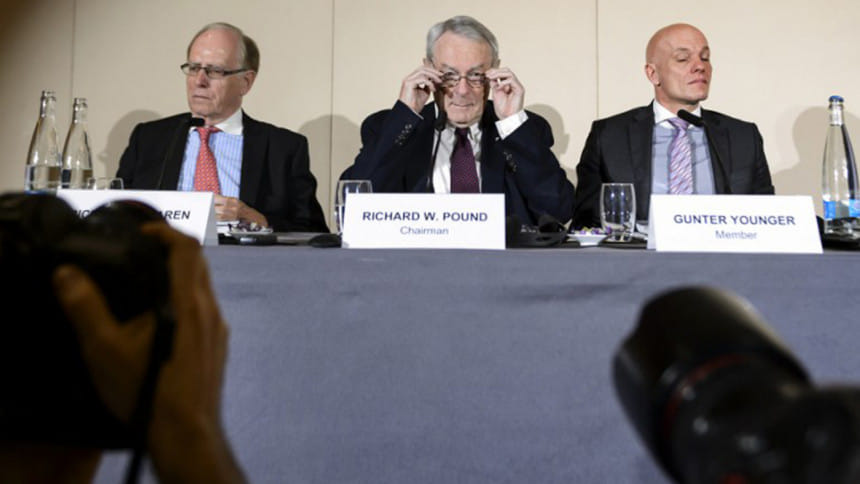Athletics doping chiefs: Ban Russia

Russia should be banned from athletics competition, a World Anti-Doping Agency commission report has recommended.
Wada's independent commission examined allegations of doping, cover-ups, and extortion in Russian athletics, which also implicated the IAAF, the sport's world governing body.
It says London 2012 was "sabotaged" by "widespread inaction" against athletes with suspicious doping profiles.
Russia was also accused of running a "state-supported" doping programme.
The report recommended that five athletes and five coaches should be given lifetime doping bans.
IAAF president Lord Coe told the BBC that the Russian athletics federation, Araf, had been asked to respond to the allegations by the end of the week. The 59-year-old said that after reviewing the feedback the IAAF "would look at a range of options, including sanctions", which could result in suspension from the sport.
"I'm not putting in a time frame but I will do whatever is necessary. This is not a swift road back," he added.
The commission's chairman, Dick Pound, who led a Wada news conference on Monday, also recommended that the Russian federation is banned from next year's Olympics.
"One of our hopes is they will volunteer to take the remedial work," he said. "If they don't the outcome may be no Russian track and field athletes in Rio. I hope they recognise it is time to change."
Russia's sports minister Vitaly Mutko told Interfax news agency that recommendations made on the basis of the report would be fulfilled, while the acting head of Araf Vadim Zelechenok said it was not for Wada to call for suspensions.
He also told the R-Sport TV station: "Any suspension should be discussed at the meeting of the IAAF in November. It should be proven that any violations were the fault of the federation and not individual sports people. We should be given a chance to clear our names."
The international police body Interpol says it will be co-ordinating a global investigation into the suspected corruption and doping.
What are the key findings?
The report's co-author, sports lawyer Richard McLaren, believes it shows "a different scale of corruption", even compared with football's ongoing Fifa scandal, saying actual results at international athletics competitions had been changed because of cheating.
The report also:
-Revealed many instances of inadequate testing and poor compliance around testing standards.
-Suggested that neither the Russian athletics federation (Araf) the Russian anti-doping agency (Rusada), nor the Russian Federation can be considered anti-doping code-compliant.
-Recommended that Wada withdraw its accreditation of the Moscow laboratory as soon as possible and advocated the permanent removal of its director Grigory Rodchenko, whom it accuses of asking for and accepting bribes and intentionally destroying samples he was told to keep.
-Confirmed allegations that some Russian doctors and/or laboratory personnel acted as enablers for systematic cheating along with athletics coaches.
-Identified the intentional and malicious destruction of more than 1,400 samples by Moscow laboratory officials after receiving written notification from Wada to preserve target samples.
-Said that Russian security service FSB were present at the Moscow and Sochi labs and that this was part of a wider pattern of "direct intimidation and interference by the Russian state with the Moscow laboratory operations."
-Found that Rusada gave athletes advance notice of tests, hid missed tests, bullied doping control officers and their families and took bribes to cover up missed tests.
-Found that a number of Russian athletes suspected of doping could have been prevented from competing at the London 2012 Olympics had it not been for "the collective and inexplicable laissez-faire policy" adopted by the IAAF and the Russian athletics federation.
-Found that Russian law enforcement was involved in efforts to "interfere with integrity of samples".
-Found evidence of multiple rules breaches by IAAF officials and found the governing body to be "inexplicably lax in following up suspicious blood (and other) profiles".
Which doping scandal is this?
The report was commissioned on a "very narrow mandate" to "determine the accuracy" of allegations made in a German TV documentary about Russian athletics last December.
It claimed Russian athletes paid 5% of their earnings to domestic doping officials to supply banned substances and cover-up tests, while athletics' world governing body the IAAF was implicated in covering up the abuse.
The programme's claims of widespread doping were made by former Russian Anti-Doping Agency (Rusada) official Vitaly Stepanov and his wife Yulia (nee Rusanova), formerly an 800m runner who was banned for doping.
It included testimony from Russian athletes admitting to using banned substances and evidence of doping and corruption.
The commission was not asked to examine separate doping claims made in August when The Sunday Times and a German broadcaster claimed leaked blood tests from 5,000 athletes over 11 years showed an "extraordinary extent of cheating". The IAAF said the allegations were "sensationalist and infuriating" and Wada is investigating them separately.
What happens next?
IAAF chief Lord Coe said the sport's governing body would wait for Russia's response before deciding whether to punish the country's federation.
"It is the right thing to do to get them to give us an answer," he told the BBC.
"I am responsible for the conduct of my sport and I want answers from the Russian athletics federation. I am tough enough to defend my sport but the point I would emphasise is this is not just limited to athletics or Russia.
"We clearly have to understand full scope of allegations. We will look at ourselves. We will move quickly on this. I want to see a sport which is transparent and accountable and I will do what I can to do that. It will not be a swift road."

 For all latest news, follow The Daily Star's Google News channel.
For all latest news, follow The Daily Star's Google News channel. 



Comments